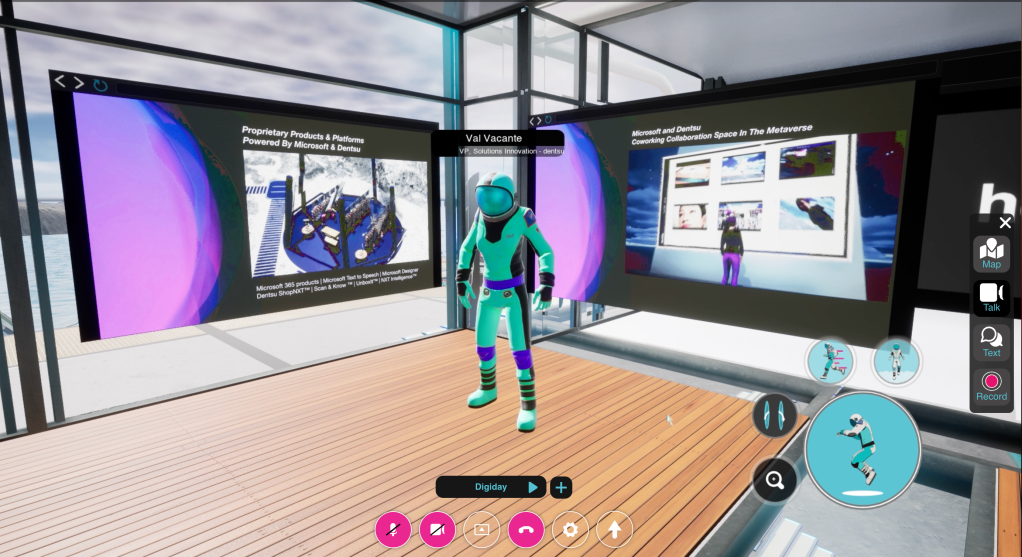Save 50% on a 3-month Digiday+ membership. Ends Dec 5.
Media Buying Briefing: What a tour through Dentsu and Microsoft’s metaverse campus says about the future of digital marketing

This Media Buying Briefing covers the latest in agency news and media buying for Digiday+ members and is distributed over email every Monday at 10 a.m. ET. More from the series →
When you first land in Dentsu’s newly-built metaverse campus in a virtual reality outer space, it can feel like you’re in “Fortnite.”
While the popular battle royale game and Dentsu’s space in metaverse productivity platform HeadOffice.Space do have one thing in common — both are built on virtual world creation tool Unreal Engine 5 — users won’t be scaling buildings or blasting one another with cannons. Instead, they can test out retail concepts or build showrooms in the metaverse that will be accessible through virtually reality devices or any online mobile and desktop devices.
In the lead-up to the Consumer Electronics Show in Las Vegas in January, Dentsu and Microsoft have collaborated to launch the Dentsu NXT Space on Moon Valley, a dedicated campus on the digital moon in the HeadOffice.Space. Again, imagine Fortnite, but the avatars are in spacesuits in outer space with futuristic offices, lounges and shops.
For Dentsu, this destination is about helping guide clients into the metaverse, whether it’s hosting expert panels or testing geo-fencing and QR code capabilities. Val Vacante, vp of solutions and innovation at Dentsu, said the focus is on creating the right experience for each client. A lot of times, partners are enthusiastic but unsure about how to enter the metaverse, so the guided tour of sorts will help the agency identify ways to support clients, Vacante said.
“I’m just a firm believer that you need to be experimenting,” Vacante told Digiday. “We cannot advise clients if we are not playing, exploring, testing, winning, failing, right? So that’s what we wanted to do here.”
Earlier this month, Dentsu International partnered with publisher Decrypt Media to establish a Web3 Center of Excellence, with the aim to provide education for employees and clients on all things Web3, a vision for the decentralized internet. Others, including Publicis Groupe and Horizon Media, have similar experiments in areas of blockchain, non-fungible tokens, metaverse and gaming as Web3 interest grows.
While the full experience of the Dentsu NXT Space will launch at CES early next year, Digiday got a preview of some features coming to the space.
Ad position: web_incontent_pos1
Microsoft-powered tools
The Dentsu Metaversity on campus will be dedicated to learning and training. One of the reasons Microsoft partnered with Dentsu is the ability to integrate its various Office and productivity tools throughout the NXT Space. Billboards and presentations are displayed around the co-working and retail spaces, all made using Powerpoint. The retail space, ShopNXT, is powered by Microsoft Dynamics 365, a suite of business and customer relationship products.
Simon Crownshaw, managing director of media and entertainment at Microsoft, said that these traditional business tools many are familiar with will bridge the gap with artificial intelligence and other cognitive and automated services that make up the metaverse.
“It’s about bringing the simplification out a little bit more, because a lot of people get confused about these developments,” he said. “It’s a fundamental evolution for developers and brands in terms of how they experience it.”
The Metaversity will also serve as a training ground for Microsoft Power Skills, where employees build skills for text-to-speech and other Microsoft Designer capabilities. Some other spaces on the Dentsu campus include the ShopNXT Showroom, Merkle Virtual Retail Lab and Intelligence Center — and the experience is guided by an artificial intelligence assistant, Neva, that also leverages Microsoft’s text-to-speech capabilities.
Ad position: web_incontent_pos2

Web3 education and research
Many agencies are currently focused on educating clients and partners around the application of metaverse products, considering how many consumers still struggle to understand the concept of a metaverse or decentralization.
As Eric Levin, chief content officer at Publicis Media, previously told Digiday, agencies have been overloaded with requests related to the metaverse following the rebrand of Facebook to Meta. But some of these topics and applications proved too complex for its teams and clients.
“Our first step with our clients was education,” Levin said. “We wrote multiple POVs, decks, presentations that explained what exactly was happening, what the evolution looked like, why it was happening now, what to expect and how to enter the space meaningfully and strategically.”
With the Dentsu campus, Vacante explained there are many opportunities to connect with partners in the metaverse to do onboarding for brands, staff training and other industry events. The retail spaces and showrooms can be used for research and experimentation for different products and services, whereas work rooms are designed for collaboration, recruitment and other events, such as an “Ask Me Anything” session with a Dentsu expert or a panel featuring clients.
Over in the Dentsu Intelligence Center, which from the outside is shaped like a DNA double helix, spaces will be used for showcasing research reports and creating immersive experiences to share the firm’s insights.
“We’re creating 3D, engaging environments, where you can interact with the numbers or different sorts of interactive bits to bring that thought leadership to life,” said Vacante.
Future of commerce and retail
Dentsu’s metaverse showroom and retail lab feature some of its own products that will be on display at CES, including Scan & Know technology, which allows consumers to scan virtual items to get product details and have the product delivered.

Another retail product, UnboxIt, lets shoppers scan a QR code upon delivery and get additional content, product instructions and other subscription details. These retail products are examples of how brands can connect consumers with their current Web2 experience on mobile devices and commerce, but in a Web3 environment.
The idea of selling virtual goods is not new, particularly with gaming and recent NFT trends. Now, brands are seeking out creative agencies to explore Web3 marketing and commerce strategies. Rebecca Orlov, CEO of Web3 creative firm Epic Play Date under Brand3, works with Web3 startups and brands offering services like Web3 onboarding, digital currencies and smart contracts.
“The key is Web3 is now and the concepts [like metaverse, virtual shopping, AR and VR] are being built as we speak,” Orlov said. “This may take months or many years, but the action of moving into this timeline is happening. … It’s critical that agencies and brands learn, understand and then create.”
Many Dentsu clients, Vacante added, are particularly interested in Web3 retail integration and testing metaverse features, such as geofencing for discounts and loyalty programs, building showrooms that integrate products with their websites or even using an AI assistant like Neva in the shopping experience. And the metaverse space will allow brands to play with experiences in an affordable way.
“We encourage this as a test and learn for all brands. There are brands who just throw a ton of money into whatever is new, right? But in reality, a lot of brands don’t have that opportunity,” Vacante said.
For example, in an experiment through the Merkle Virtual Retail Lab, a partner doing diversity and inclusion research in the metaverse was able to save some 70% in costs and increase participation by 300% compared to a traditional in-person survey, according to Dentsu. There are many ways businesses can save on renting a space, recruiting, providing food and other overhead costs when not limited by real-world constraints, Vacante added.
“Pixels are endless, so you can make the space however big or however small you want,” Vacante said. “We’re making some solid progress there, and that’s just tangible math.”
Color by numbers
Movies, or at least some of them (we’re looking at you, “Maverick”) are making a comeback, and that might tell us more about spending and brand affinity. National CineMedia and customer purchase data platform Affinity Solutions this month reported new data on movies and consumer spending, surveying more than 100 million consumers and 8 million moviegoers. When analyzing spending habits of those going to see the blockbusters “Dr. Strange in the Multiverse of Madness” and “Top Gun: Maverick,” they found that people entered “shopping spree” mode and spent twice as much compared to non-moviegoers. Some takeaways:
- Moviegoers in the study were more active spenders when compared to their non-moviegoer counterparts — spending more in amount and more frequently across retail, dining, travel and automotive categories during or around the movie experience.
- Regardless of the day of the movie, these consumers spent more at bars, restaurants and on sporting goods and digital content compared to people who stay home.
- There was also a different spending pattern depending on the age group. Gen Z and millennials who saw “Dr. Strange” spent more on flowers, jewelry and online gaming, whereas Gen X and baby boomers who saw “Top Gun” spent more on landscaping and appliances. (Why? We don’t know.)
- “Dr. Strange” attendees showed an “incremental sales lift” for Delta, T-Mobile and McDonald’s. “Top Gun” attendees demonstrated an affinity for Amazon, Disney and United Airlines.
Takeoff & landing
- In a bid to steady itself in turbulent times under new owner Elon Musk, Twitter tapped EMEA vp Chris Riedy to be its new head of ad sales, replacing Robin Wheeler, who recently quit, was convinced to stay by Musk, then quit again.
- Harman International, which owns audio brands including JBL and Harman Kardon, named Havas Group as its global agency of record, which includes all media work.
- Independent Giant Spoon hired Darrell Jursa to be its executive vp of data and platforms, hiring the longtime Omnicom commerce executive from his most recent position as vp of global media enablement at IRI.
Direct quote
“Often the programmatic guaranteed [CTV] deals are made directly with the publisher — often through an API based platform, or perhaps as part of an upfront deal or direct IO. The point is, they’re often not being transacted within the primary DSP of the advertiser. So even though they’re programmatic, they’re not being managed holistically alongside the whole campaign or other campaigns. This is one of the reasons that it’s still challenging to manage frequency and deduplicate reach across channels. Advertisers, in many cases, would like to be doing more of their CTV buying through their DSP, and it’s not always possible to do as much as they would like.”
Nicole Perrin, vp of business intelligence at Advertiser Perceptions, talking about the challenges of buying CTV programmatically. Read more of Perrin’s thoughts on the state of first-party data.
Speed reading
- Digiday senior editor of media buying and planning Michael Bürgi wrote about data asset management tool provider Tenovos getting a $10 million infusion from S4S Ventures and Bertelsmann’s BDMI unit.
- Digiday gaming and esports reporter Alexander Lee follows the efforts of Toby “Tubbo” Smith, whose TubNet is bringing more brand activations to Minecraft, which historically hasn’t been known as a huge branding destination.
- For the latest news and trends in television, including the current state of CTV ad performance, and the return of Bob Iger to Disney, check out Digiday senior media editor Tim Peterson’s Future of TV Briefing.
More in Media

What publishers are wishing for this holiday season: End AI scraping and determine AI-powered audience value
Publishers want a fair, structured, regulated AI environment and they also want to define what the next decade of audience metrics looks like.

Digiday+ Research Subscription Index 2025: Subscription strategies from Bloomberg, The New York Times, Vox and others
Digiday’s third annual Subscription Index examines and measures publishers’ subscription strategies to identify common approaches and key tactics among Bloomberg, The New York Times, Vox and others.

From lawsuits to lobbying: How publishers are fighting AI
We may be closing out 2025, but publishers aren’t retreating from the battle of AI search — some are escalating it, and they expect the fight to stretch deep into 2026.
Ad position: web_bfu



